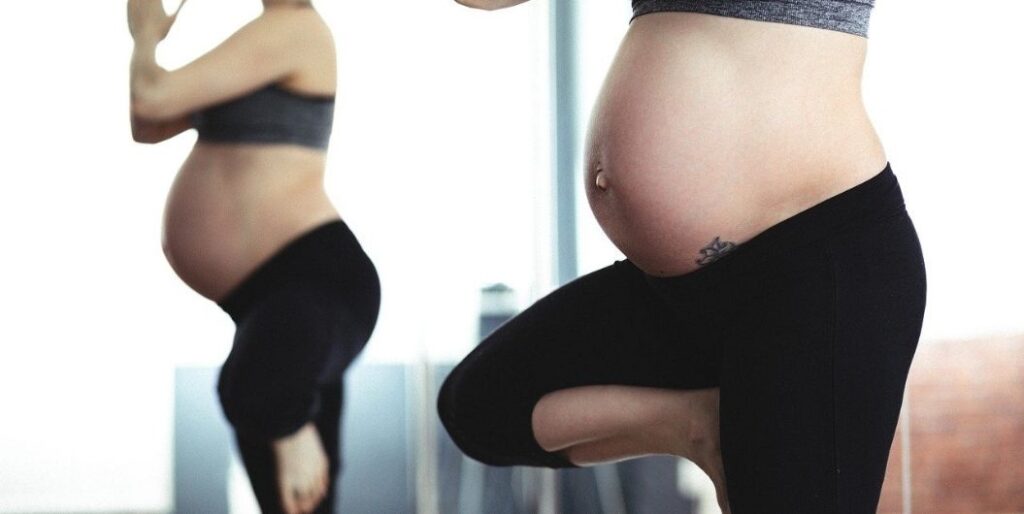Pregnancy and Exercise, Stay Healthy and Exercise During Pregnancy, Suggested Pregnancy Exercises, Fit Pregnancy

As many moms will tell you, pregnancy is a marathon, and being physically fit will help you cope with the physical challenges of both pregnancy and childbirth. Exercising during pregnancy not only helps maintain your current physical condition, but it can improve sleep, flood your brain with mood boosting endorphins, improve your endurance and strengthen those muscles you need to keep your growing body on its feet! Exercise also prepares your body for the rigors of childbirth, and allows you to bounce back into shape quicker after the birth.
It is important to always consult your doctor when considering an exercise routine, especially if you weren’t particularly active before pregnancy. Some women simply should not exercise during pregnancy for health reasons. Women who have heart and/or lung disease, an incompetent cervix, bleeding, preterm labor, preeclampsia, ruptured membranes, placenta previa or are pregnant with multiples should not exercise during pregnancy.
If you were active before the pregnancy, your exercise routine may no longer be appropriate. Generally, the best exercise is low impact and includes activities such as walking, swimming, stationary bicycling, prenatal yoga, aerobics and weight training. With yoga, aerobics and weight training, classes should be geared toward pregnant women to ensure proper, safe technique. Stay away from activities that are inherently dangerous, such as contact sports, horseback riding, water skiing and bike riding.

According to the American College of Obstetricians and Gynecologists, women should exercise no more than 30 minutes at a time, one to three times per week, although some doctors suggest some form of exercise most days of the week. In your first trimester, you might start with 15 minutes, and build up to 30 minutes by your second trimester. Remember to keep the exercise low intensity — exercise should be geared towards maintaining your fitness level instead of increasing it.
Pregnant women should adhere to the following guidelines when exercising:
- Warm up: Spend about five to 15 minutes stretching and warming up.
- Drink lots of fluids: Be sure to stay hydrated, with eight ounces (226 g) of water before exercising, and an additional eight ounces for every 20 minutes of exercise.
- Stay cool: Wear cool, layered clothing and don’t exercise in extremely hot and/or humid conditions. Overheating can be dangerous for both you and your baby.
- Take it slow: Don’t push yourself; listen to your body’s cues. Remember to change positions slowly, as your balance and center of gravity will shift as your baby grows.
- Don’t lie flat: Lying on your back puts weight on the vena cava, a major vein. This can reduce blood flow to you and your baby.
- Cool down: Slowly return to your resting rate by doing cool down exercises and stretches.
Although exercising has many benefits, there are some dangers to be aware of. Pay attention to how you’re feeling and remember that you may not be able to exercise at your pre-pregnancy level. The following are signs that you may be experiencing a dangerous complication and should call your doctor immediately:

- Nausea: Exercise causes a build up of lactic acid, and may lead to nausea. This is a sign that you are working out too strenuously.
- Temperature changes: Sudden, hot, or even cold, flashes may mean that your body is struggling to maintain its temperature.
- Heart palpitations: Palpitations, or palpitations accompanied by dizziness, headaches or blurred vision can signal a change in your blood pressure which should be assessed by a doctor.
- Swelling in lower legs: If you notice swelling or pain in your legs, specifically your calves, this may be an indication of thrombophlebitis or a blood clot.
- Vaginal bleeding or fluid: Any bleeding or sudden gush or leakage of fluid from the vagina is cause for extreme concern.
- Fainting: Loss of consciousness may indicate a serious complication, and can lead to a fall and/or injury to the mother or baby.
- Extreme pain: Any sharp pains, especially in your stomach or chest should be reported to a doctor, and exercise should be immediately stopped.
Since exercising is so important during pregnancy, be sure to pick something you enjoy and look forward to doing. Exercises like yoga or even swimming can be both relaxing and meditative, which are important to counteract the exhaustive physical and mental rigors of pregnancy. Don’t forget to up your caloric intake, by about 300-500 calories per day, to compensate for a growing baby and calories burned during exercise.
